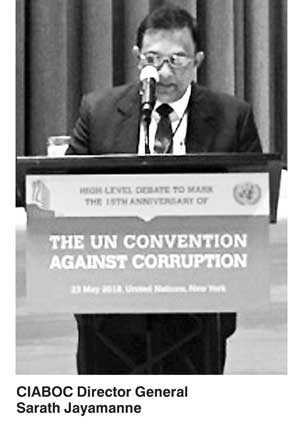Friday Feb 20, 2026
Friday Feb 20, 2026
Saturday, 9 June 2018 00:00 - - {{hitsCtrl.values.hits}}


Sri Lanka participated prominently in the High-Level debate of the United Nations General Assembly to mark the 15th anniversary of the United Nations Convention against Corruption (UNCAC). The event was held on 23 May at the United Nations Headquarters in New York and was well attended by ministers and other high officials of anti-corruption entities of member states.
The Convention was adopted by the UN General Assembly on 31 October 2003, and entered into force upon ratification by 30 States on 14 December 2005. Today, a vast majority of United Nations Member States are parties (184 countries) to the Convention. Sri Lanka was one of the first countries to become a party to the Convention in March 2004.
Sarath Jayamanne, President’s Counsel and Director General of the Commission to Investigate Allegations of Bribery and Corruption – Sri Lanka, delivering a statement during the High-Level Segment of the Debate said that Sri Lanka remains fully committed to implementing the provisions of the Convention in an effective manner.
“The 19th Amendment to the Constitution of Sri Lanka was one of the first steps taken by a new administration in 2015 stating their commitment to democracy, good governance, independence of the Judiciary, and the rule of law. This amendment, established independent commissions namely: the Judicial services, Police, public service, human rights, elections, finance, audit and, of course the Commission to Investigate Allegations of Bribery and Corruption (CIABOC) of which I am Director General,” he said. Jayamanne noted that setting up independent commissions gave new life to existing institutions with an anti-corruption mandate, and that is also formed new bodies charged with fighting corruption. Significantly, it recognised the importance of implementing the provisions of UNCAC, he added.
As an example of independence, Jayamanne pointed out that CIABOC recently arrested two high ranking officials at the highest levels of government on charges of bribery. “This not only demonstrated the independence of our body, but also the policy of non-interference. These arrests marked a landmark in our work on anti-corruption, as this was the highest ranking official to have been arrested, while in office, in 60 years,” he said.
The Bribery and Corruption Chief also stressed that the independence of these Commissions from any kind of political influence was crucial in fighting corruption and restoring confidence in the system.
J.C. Weliamuna, PC, Chairman of the Special Presidential Task Force on Recovery of State Assets – Sri Lanka had been invited by the United Nations Office of Drugs and Crime (UNODC) to serve as a panellist on the panel titled ‘Achieving peaceful and inclusive societies through preventing and combating corruption,’ during the full day event.
Weliamuna pointed out that in many situations even after peaceful regime change, the political will to reform a corrupt system is obstructed due to bureaucracy by those who have been beneficiaries of previous corrupt regimes.
He said that political will and bureaucratic will are both equally important, urging that it was time to explore the possibilities of establishing a UN Working group to examine “the post state capture” realities in relation to fragile governance structures and bureaucracies.
On the sidelines of the high level meeting, Sarath Jayamanne, Director General, CIABOC, had a bilateral meeting with John Brandolino, Director of the Division of Treaty Affairs of the UNODC where the existing levels of cooperation between the Government of Sri Lanka and the UNODC was emphasised. In recognition of the active role on anti-corruption played by Sri Lanka, it was noted that the UNODC had decided to hold a meeting of global experts in Colombo in July 2018.
Both Brandolino and Jayamanne agreed to work closely in achieving shared objectives of anti-corruption. Ambassador Dr. Rohan Perera, PC, Permanent Representative of Sri Lanka to the UN and Sonali Samarasinghe, Attorney at Law, Minister, Permanent Mission of Sri Lanka to the UN were also present at the meeting.